【单元一遍过】Unit 5 Let's celebrate!复习课件(共35张PPT)
文档属性
| 名称 | 【单元一遍过】Unit 5 Let's celebrate!复习课件(共35张PPT) |

|
|
| 格式 | pptx | ||
| 文件大小 | 777.7KB | ||
| 资源类型 | 教案 | ||
| 版本资源 | 牛津译林版 | ||
| 科目 | 英语 | ||
| 更新时间 | 2023-07-13 00:00:00 | ||
图片预览

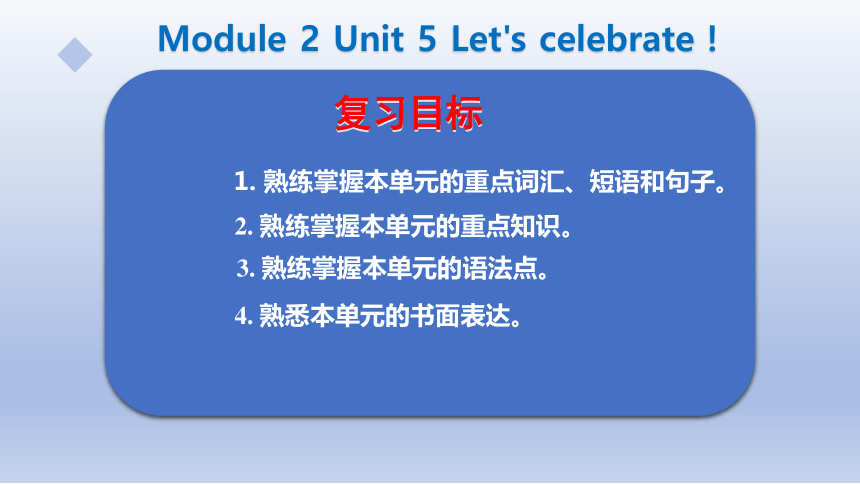
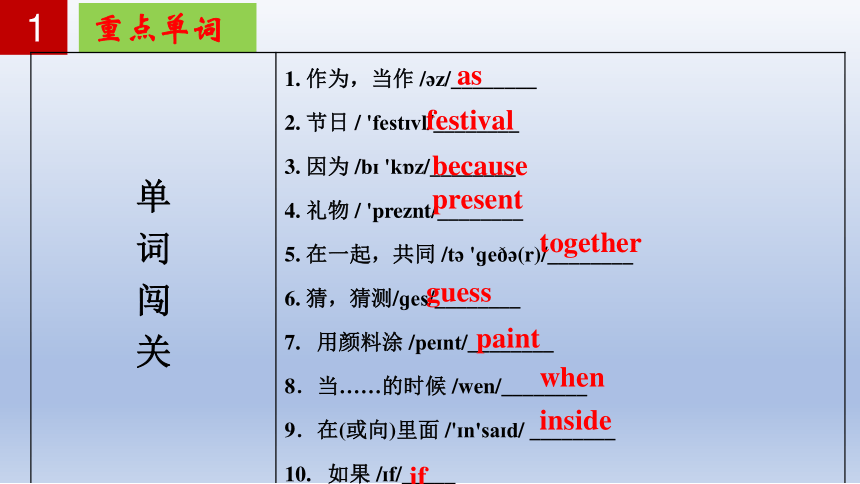
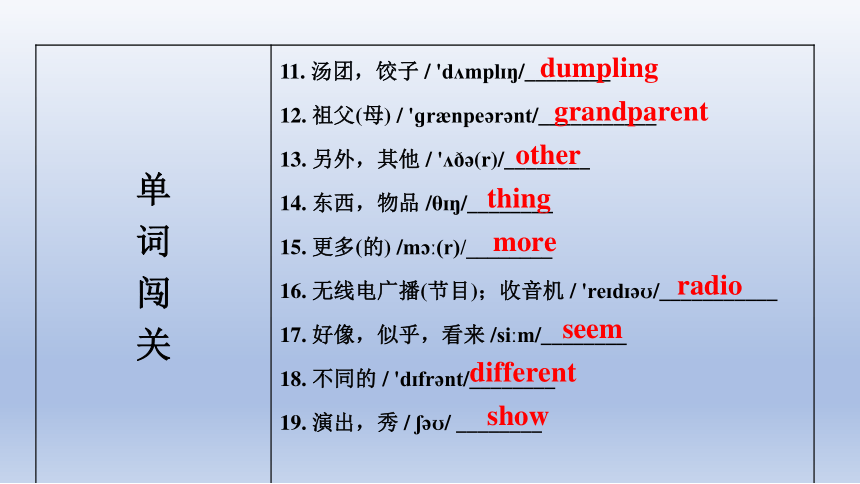
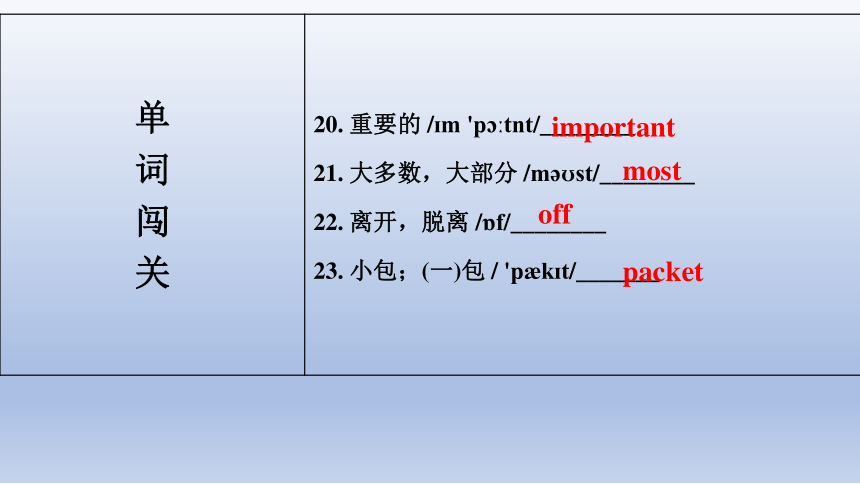
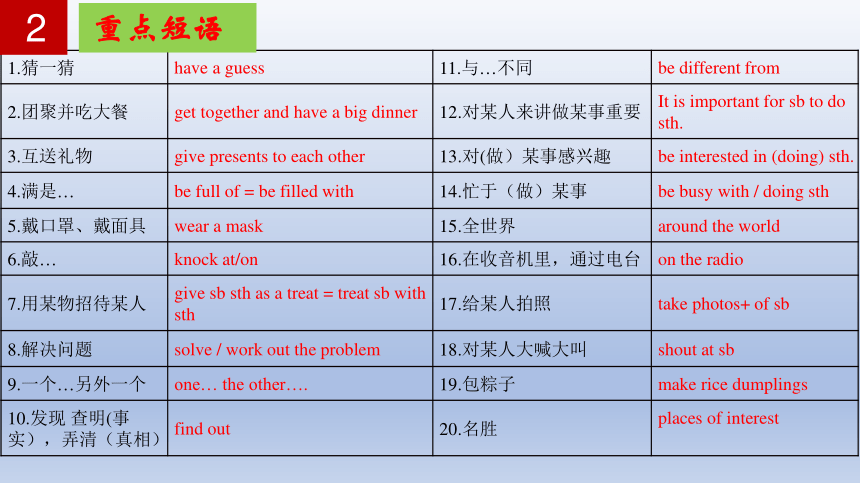
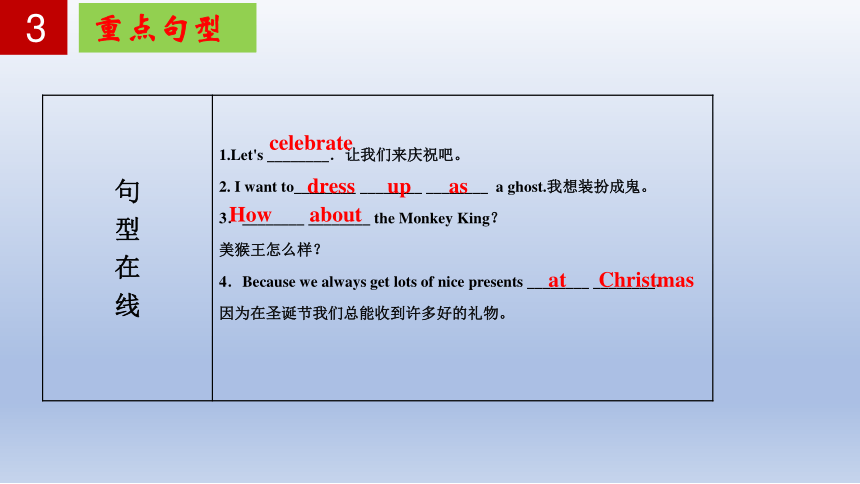


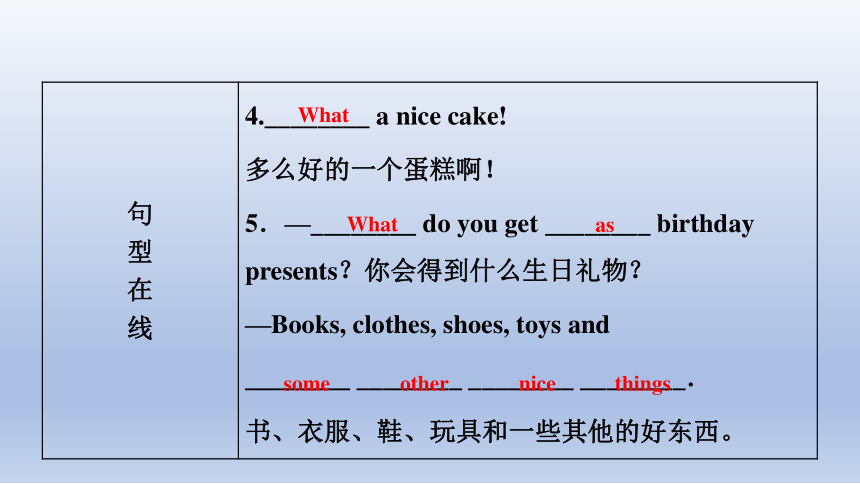

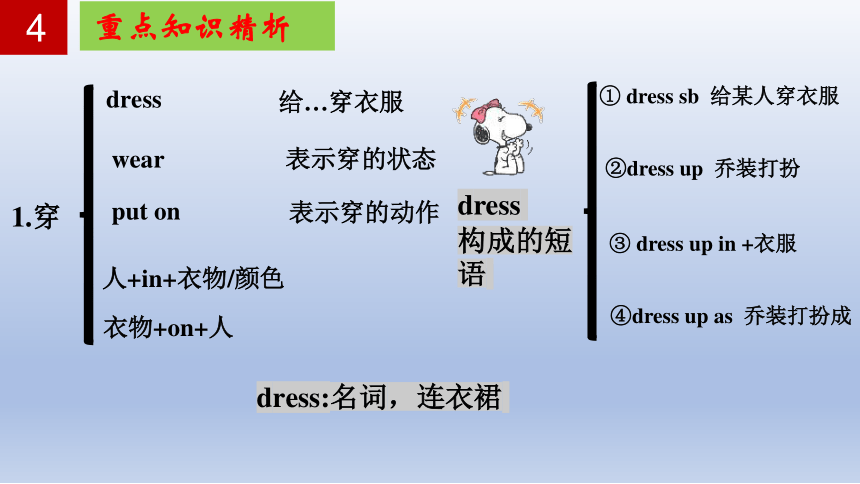
文档简介
(共35张PPT)
牛津译林版七年级上册
Module 2
Unit 5 Let's celebrate!
目录页
1、单击此处添加标题
2、单击此处添加标题
3、单击此处添加标题
4、单击此处添加标题
5、单击此处添加标题
复习目标
1. 熟练掌握本单元的重点词汇、短语和句子。
3. 熟练掌握本单元的语法点。
4. 熟悉本单元的书面表达。
2. 熟练掌握本单元的重点知识。
Module 2 Unit 5 Let's celebrate!
重点单词
1
单 词 闯 关 1. 作为,当作 / z/________
2. 节日 / 'fest vl/________
3. 因为 /b 'k z/________
4. 礼物 / 'preznt/________
5. 在一起,共同 /t 'ɡe (r)/________
6. 猜,猜测/ɡes/________
7. 用颜料涂 /pe nt/________
8.当……的时候 /wen/________
9.在(或向)里面 /' n'sa d/ ________
10. 如果 / f/_____
as
festival
because
present
together
guess
paint
when
inside
if
单 词 闯 关 11. 汤团,饺子 / 'd mpl /________
12. 祖父(母) / 'ɡr npe r nt/___________
13. 另外,其他 / ' (r)/________
14. 东西,物品 /θ /________
15. 更多(的) /m (r)/________
16. 无线电广播(节目);收音机 / 're d /___________
17. 好像,似乎,看来 /si m/________
18. 不同的 / 'd fr nt/________
19. 演出,秀 / / ________
dumpling
grandparent
other
thing
more
radio
seem
different
show
单 词 闯 关 20. 重要的 / m 'p tnt/________
21. 大多数,大部分 /m st/________
22. 离开,脱离 / f/________
23. 小包;(一)包 / 'p k t/_______
important
most
off
packet
1.猜一猜 have a guess 11.与…不同 be different from
2.团聚并吃大餐 get together and have a big dinner 12.对某人来讲做某事重要 It is important for sb to do sth.
3.互送礼物 give presents to each other 13.对(做)某事感兴趣 be interested in (doing) sth.
4.满是… be full of = be filled with 14.忙于(做)某事 be busy with / doing sth
5.戴口罩、戴面具 wear a mask 15.全世界 around the world
6.敲… knock at/on 16.在收音机里,通过电台 on the radio
7.用某物招待某人 give sb sth as a treat = treat sb with sth 17.给某人拍照 take photos+ of sb
8.解决问题 solve / work out the problem 18.对某人大喊大叫 shout at sb
9.一个…另外一个 one… the other…. 19.包粽子 make rice dumplings
10.发现 查明(事实),弄清(真相) find out 20.名胜 places of interest
2
重点短语
句 型 在 线 1.Let's ________.让我们来庆祝吧。
2. I want to________ ________ ________ a ghost.我想装扮成鬼。
3.________ ________ the Monkey King?
美猴王怎么样?
4.Because we always get lots of nice presents ________ ________.
因为在圣诞节我们总能收到许多好的礼物。
celebrate
dress up as
How about
at Christmas
3
重点句型
句 型 在 线 5.We have ______ ________ in the USA, and I like Halloween ________.
在美国我们有一些节日,我最喜欢万圣节前夕。
6. If they do not give us a treat, we________ ________ ________ ________ them.
如果他们不招待我们,我们就捉弄他们。
some festivals
best
play
a trick on
句 型 在 线 7.We always ________ ____ ________ ________ the evening of October 31 and ________ nice food and drinks.
我们总是在10月31号的晚上举行聚会,并享用美味的食物和饮料。
8.People ________ lanterns ________ oranges.
人们用橘子制作灯笼。
have a party on
enjoy
make
out of
句 型 在 线 4.________ a nice cake!
多么好的一个蛋糕啊!
5.—________ do you get ________ birthday presents?你会得到什么生日礼物?
—Books, clothes, shoes, toys and
________ ________ ________ ________.
书、衣服、鞋、玩具和一些其他的好东西。
What
as
What
some other nice things
句 型 在 线 9.Usually our parents get new clothes________ ________ us, and we get red packets________ our grandparents…
通常我们的父母为我们准备新衣服,我们从
我们的祖父母……那里得到红包。
10.Children have ________ ________ _____ ___ this day.这一天,孩子们玩得非常开心。
ready
for
from
lots of fun on
1.穿
dress
wear
人+in+衣物/颜色
衣物+on+人
put on
给…穿衣服
表示穿的状态
表示穿的动作
dress:名词,连衣裙
① dress sb 给某人穿衣服
②dress up 乔装打扮
dress
构成的短语
③ dress up in +衣服
④dress up as 乔装打扮成
4
重点知识精析
2. Let's celebrate.让我们来庆祝吧。
[探究] “Let's+________+其他.”是表示征求意见或提建议的句型,意为“(让)我们……吧。”
动词原形
[拓展]英语中常用的提建议的结构:
(1)“________ you like/love (to do) sth?”意为“你想要某物/做某事吗?”
Would
(2)“________ I/we do sth?”意为“我/我们做某事好吗?”,语气较委婉,商量的语气较浓。
(3)“Why not ________ sth?”意为“为什么不做某事呢?”,可与“Why ________ you/we do sth?”进行同义转换。
(4)“What/________ about…?”意为“……怎么样?”,后接名词、代词或动名词。
(5)had better (not) ________ sth 意为“最好(不)做某事”,用于表示对下级或晚辈的劝告,往往带有命令的语气。
Shall
do
don't
How
do
3. Because we always get lots of nice presents at Christmas.
因为在圣诞节我们总能收到许多好的礼物。
[探究] because为连词,意为“________”,表示直接原因,后面接句子,常用来回答________引导的特殊疑问句。
因为
why
[注意]在汉语中,我们常说“因为……,所以……”,但是在英语中,because 与________不能用在同一个句子中。
Because she is ill, she can't go to school.
=She is ill, so she can't go to school.
她病了,因此她不能去上学了。
so
[探究] more用作代词,表示“更多的人或物”,是much和________的比较级。
many
[拓展] (1)more用在数量词之后,表示“另外的;外加的”,构成“________+more+名词”结构,含有在原来既定量的基础上“再多一点”之意。如:five more books再多五本书
(2)“________+数词+可数名词复数”结构也可以表示“再多……”。如:another ten minutes 再多十分钟
数词
another
4.more
Find out more on New York Radio.在纽约电台发现更多的信息。
5. find out 找出,发现
look for, find, find out
【词组辨析】
①look for意为“寻找”,是有目的地找,强调“寻找”这一动作
②find意为“找到”“发现”,强调“找”的结果,其宾语往往是某个丢失的东西或人
③ find out着重表示通过理解、分析、思考、询问等“弄清楚”“查明”一件事情,其后的宾语常常是某个情况、事实.
[拓展] (1)be different ________…意为“与……不同”。
Life in the country is different from that in the city.
乡村的生活和城市的生活是不同的。
(2)different的名词形式是difference,为可数名词;其副词形式是differently。
There are five differences between the two pictures.
这两幅画中有五处不同。
from
6.different
Boys and girls may behave differently.
男孩和女孩的表现可能不同。
(3)different的反义词为same,意为“相同的”,使用时需要与the连用。be the same as 意为“与……相同”。
Jane and I are in the same school, but we are in different classes.
我和简在同一所学校,但是我们在不同的班级。
[探究] most 作形容词,后面接________,意为“大多数,大部分”。most 作代词,意为“大多数,大部分”,________…意为“……中的大部分/大多数”。
Most students like playing computer games. 大多数学生喜欢玩电脑游戏。
名词
most of
7.most det.& pron. 大多数,大部分
[拓展] (1)most作副词,意为“最,最多;非常,极其”,like…most意为“最喜欢……”;need…most意为“最需要……”。
(2)若所修饰的名词前有限定词或直接放在代词前,要用________,不能用most。
Most of the students are girls. 大多数学生是女生。
Most of them don't know this animal.
他们中的大多数人不认识这种动物。
most of
8.interesting:令人感兴趣的 ;interested:感兴趣的
形容词 ing 指_________,形容词ed指__________。
我们学过的有类似用法的单词还有:
surprised ; surprising
excited ; exciting
事物的性质
人的内心感受
辨析 意义和用法
v. -ing形容词 一般用来形容“物体本身具有的性质”,表示“令人……的”。主语一般是物。
v. -ed形容词 一般用来形容“人的感受”,表示“感到……的”。主语一般是人。
重要短语:对…感兴趣
be interested in…
(6.) Shall we do sth
(1.) Let’s do sth , shall we
(2.) Why don’t you do sth
(3.) Why not do sth
(4.) How about doing sth
(5.) What about doing sth
9.表示提建议的句型
10.[辨析] other, the other, others与the others
other 作定语,修饰名词。
the other 指________人或事物中的“另一个”。
others 指一定范围内除去一部分后其余人或物的________。
the others 指一定范围内除去一部分后其余________的人或物。
两个
一部分
全部
5. —Why are you so happy?你为什么如此高兴?
—Because it is my birthday!因为今天是我的生日!
6. —How do you get to school?你怎样到达学校?
—I get to school by bus.我乘坐公共汽车到校。
语法探究
特殊疑问词(组) 用法 例句
what 意为“________”,用来询问物品、职业或活动等。 —What is that 那是什么?
—It's a bag.它是一个包。
which 意为“哪一个,________”,用来具体地询问物品或人。 —Which would you like
你想要哪一个?
—I'd like the white one.
我想要白色的那一个。
who 意为“________”,用来询问人。 —Who do you travel with
你和谁一起旅行?
—My father.我父亲。
哪一些
什么
谁
语法聚焦
[特殊疑问词(组)]
教材典句
1. —Where is your classroom 你的教室在哪里?
—It's on the ground floor. 在一楼。
2. —Whose mask is this 这是谁的面具?
—It's Amy's. 是埃米的。
3. —Who is that girl in a red coat 穿红色大衣的那个女孩是谁?
—That's Kitty. 那是基蒂。
4. —What does he want for Christmas?圣诞节他想要什么?
—He wants a toy train. 他想要一个玩具火车。
特殊疑问词(组) 用法 例句
why 意为“________”,用来询问原因。 —Why do you like dancing
你为什么喜欢跳舞?
—Because it's fun.因为它有趣。
how 意为“________”,用来询问方式或程度。 —How does she go to school
她怎样去上学?
—She takes a bus.她乘坐公交车。
—How is the story 这个故事怎么样?
—It's very interesting.它很有趣。
how many 意为“多少”,用来询问________名词的数量。 —How many books are there in the bag 包里有多少本书?
—There are 10.有10本。
为什么
如何
可数
特殊疑问词(组) 用法 例句
how soon 意为“多久以后”,用来对“________+一段时间”提问。 —How soon will he come back 他多久之后回来?
—In two weeks.两周后。
how far 意为“多远”,用来对________或路程提问。 —How far is it from your home to your school
从你家到学校多远?
—20 minutes by bike.
骑自行车二十分钟。
in
距离
③将疑问词移到句首:
When do they celebrate Halloween
怎样写出特殊疑问句 (怎样划线提问)?
(陈述句)They celebrate Halloween on October 31.
①先把陈述句变为一般疑问句(注意助动词):
Do they celebrate Halloween on October 31
② 划线部分变为疑问词(要想对疑问词):
Do they celebrate Halloween on October 31
when
We celebrate Christmas by giving presents.
________________________________
2. The shoes in the box are for Jack. (易错)
_______________________________
3. This room is Tom and Bob’s
__________________________
How do you celebrate Christmas
Which shoes are for Jack
Whose is this room
4. Miss Green is my English teacher.
__________________________________
5. I buy this card because I like the picture.
__________________________________
Who is Miss Green
Why do you buy this card
写出特殊疑问句 (划线提问):
单项选择:
( ) 1. —I think you are a good student. —______.
A. No, I’m not B. It’s very kind of you
C. No, I don’t think so D. That’s all right
( ) 2. We sometimes play games ______ lunchtime.
A. with B. for C. at D. on
( ) 3. He often ______ my desk.
A. knock at B. knock on C. knocks at D. knocks in
( ) 4. —What does Tony want ______ Christmas
—He would like a model plane.
A. for B. to C. in D. by
B
C
C
A
( ) 5. —___ do you often go out with your friends
–For dinner.
A. What B. When C. Why D. Where
( ) 6. —___is this pair of glasses — I think it is our ___.
A. Whose; teacher’s B. Who; teacher’s
C. Whose; teachers’ D. Who; teacher
( ) 7. You can learn more ______ New York Radio.
A. in B. on C. at D. /
( ) 8. —Happy Halloween! —______!
A. Thank you B. That’s all right
C. Not at all D. The same to you
C
A
B
D
书面表达
时间 行程安排
10.2 坐飞机去北京,上午10:30到达,下午欣赏京剧
10.3 上午去爬长城,下午去颐和园游玩并拍照
10.4 购物并品尝美食
10.5 乘火车返回
假设国庆节期间你打算与你的家人去北京旅行,请根据表格内容,用英语写一篇80词左右的短文,介绍一下你们的行程安排。
注意:短文的结尾已给出,不计入总词数。
____________________________________________________________________________________________________________________________________________________________________________________________________________
I’m looking forward to the trip and I’m sure we’ll have a good time there.
One possible version:
I am planning to visit Beijing during the National Day holiday with my family. We’ll get there by air at 10: 30 a m, on October 2, and we can enjoy Beijing opera in the afternoon. We are going to climb the Great Wall on the morning of October 3, and then visit the Summer Palace in the afternoon. We can take photos there. On October 4, we will do some shopping and try some delicious food. On the fifth of October, we will go back home by train.
I’m looking forward to the trip and I’m sure we’ll have a good time there.
1. 题干解读:题目要求写一篇英语短文介绍国庆假期的行程安排;要求包含所有提示内容。
2. 写作指导:此作文时态用一般将来时;采用第一人称口吻;可采用2段落格式,第一段:介绍4天具体的行程安排;第二段:表达自己对假期的期待。写作时确保语句通顺,无单词语法错误。
牛津译林版七年级上册
Module 2
Unit 5 Let's celebrate!
目录页
1、单击此处添加标题
2、单击此处添加标题
3、单击此处添加标题
4、单击此处添加标题
5、单击此处添加标题
复习目标
1. 熟练掌握本单元的重点词汇、短语和句子。
3. 熟练掌握本单元的语法点。
4. 熟悉本单元的书面表达。
2. 熟练掌握本单元的重点知识。
Module 2 Unit 5 Let's celebrate!
重点单词
1
单 词 闯 关 1. 作为,当作 / z/________
2. 节日 / 'fest vl/________
3. 因为 /b 'k z/________
4. 礼物 / 'preznt/________
5. 在一起,共同 /t 'ɡe (r)/________
6. 猜,猜测/ɡes/________
7. 用颜料涂 /pe nt/________
8.当……的时候 /wen/________
9.在(或向)里面 /' n'sa d/ ________
10. 如果 / f/_____
as
festival
because
present
together
guess
paint
when
inside
if
单 词 闯 关 11. 汤团,饺子 / 'd mpl /________
12. 祖父(母) / 'ɡr npe r nt/___________
13. 另外,其他 / ' (r)/________
14. 东西,物品 /θ /________
15. 更多(的) /m (r)/________
16. 无线电广播(节目);收音机 / 're d /___________
17. 好像,似乎,看来 /si m/________
18. 不同的 / 'd fr nt/________
19. 演出,秀 / / ________
dumpling
grandparent
other
thing
more
radio
seem
different
show
单 词 闯 关 20. 重要的 / m 'p tnt/________
21. 大多数,大部分 /m st/________
22. 离开,脱离 / f/________
23. 小包;(一)包 / 'p k t/_______
important
most
off
packet
1.猜一猜 have a guess 11.与…不同 be different from
2.团聚并吃大餐 get together and have a big dinner 12.对某人来讲做某事重要 It is important for sb to do sth.
3.互送礼物 give presents to each other 13.对(做)某事感兴趣 be interested in (doing) sth.
4.满是… be full of = be filled with 14.忙于(做)某事 be busy with / doing sth
5.戴口罩、戴面具 wear a mask 15.全世界 around the world
6.敲… knock at/on 16.在收音机里,通过电台 on the radio
7.用某物招待某人 give sb sth as a treat = treat sb with sth 17.给某人拍照 take photos+ of sb
8.解决问题 solve / work out the problem 18.对某人大喊大叫 shout at sb
9.一个…另外一个 one… the other…. 19.包粽子 make rice dumplings
10.发现 查明(事实),弄清(真相) find out 20.名胜 places of interest
2
重点短语
句 型 在 线 1.Let's ________.让我们来庆祝吧。
2. I want to________ ________ ________ a ghost.我想装扮成鬼。
3.________ ________ the Monkey King?
美猴王怎么样?
4.Because we always get lots of nice presents ________ ________.
因为在圣诞节我们总能收到许多好的礼物。
celebrate
dress up as
How about
at Christmas
3
重点句型
句 型 在 线 5.We have ______ ________ in the USA, and I like Halloween ________.
在美国我们有一些节日,我最喜欢万圣节前夕。
6. If they do not give us a treat, we________ ________ ________ ________ them.
如果他们不招待我们,我们就捉弄他们。
some festivals
best
play
a trick on
句 型 在 线 7.We always ________ ____ ________ ________ the evening of October 31 and ________ nice food and drinks.
我们总是在10月31号的晚上举行聚会,并享用美味的食物和饮料。
8.People ________ lanterns ________ oranges.
人们用橘子制作灯笼。
have a party on
enjoy
make
out of
句 型 在 线 4.________ a nice cake!
多么好的一个蛋糕啊!
5.—________ do you get ________ birthday presents?你会得到什么生日礼物?
—Books, clothes, shoes, toys and
________ ________ ________ ________.
书、衣服、鞋、玩具和一些其他的好东西。
What
as
What
some other nice things
句 型 在 线 9.Usually our parents get new clothes________ ________ us, and we get red packets________ our grandparents…
通常我们的父母为我们准备新衣服,我们从
我们的祖父母……那里得到红包。
10.Children have ________ ________ _____ ___ this day.这一天,孩子们玩得非常开心。
ready
for
from
lots of fun on
1.穿
dress
wear
人+in+衣物/颜色
衣物+on+人
put on
给…穿衣服
表示穿的状态
表示穿的动作
dress:名词,连衣裙
① dress sb 给某人穿衣服
②dress up 乔装打扮
dress
构成的短语
③ dress up in +衣服
④dress up as 乔装打扮成
4
重点知识精析
2. Let's celebrate.让我们来庆祝吧。
[探究] “Let's+________+其他.”是表示征求意见或提建议的句型,意为“(让)我们……吧。”
动词原形
[拓展]英语中常用的提建议的结构:
(1)“________ you like/love (to do) sth?”意为“你想要某物/做某事吗?”
Would
(2)“________ I/we do sth?”意为“我/我们做某事好吗?”,语气较委婉,商量的语气较浓。
(3)“Why not ________ sth?”意为“为什么不做某事呢?”,可与“Why ________ you/we do sth?”进行同义转换。
(4)“What/________ about…?”意为“……怎么样?”,后接名词、代词或动名词。
(5)had better (not) ________ sth 意为“最好(不)做某事”,用于表示对下级或晚辈的劝告,往往带有命令的语气。
Shall
do
don't
How
do
3. Because we always get lots of nice presents at Christmas.
因为在圣诞节我们总能收到许多好的礼物。
[探究] because为连词,意为“________”,表示直接原因,后面接句子,常用来回答________引导的特殊疑问句。
因为
why
[注意]在汉语中,我们常说“因为……,所以……”,但是在英语中,because 与________不能用在同一个句子中。
Because she is ill, she can't go to school.
=She is ill, so she can't go to school.
她病了,因此她不能去上学了。
so
[探究] more用作代词,表示“更多的人或物”,是much和________的比较级。
many
[拓展] (1)more用在数量词之后,表示“另外的;外加的”,构成“________+more+名词”结构,含有在原来既定量的基础上“再多一点”之意。如:five more books再多五本书
(2)“________+数词+可数名词复数”结构也可以表示“再多……”。如:another ten minutes 再多十分钟
数词
another
4.more
Find out more on New York Radio.在纽约电台发现更多的信息。
5. find out 找出,发现
look for, find, find out
【词组辨析】
①look for意为“寻找”,是有目的地找,强调“寻找”这一动作
②find意为“找到”“发现”,强调“找”的结果,其宾语往往是某个丢失的东西或人
③ find out着重表示通过理解、分析、思考、询问等“弄清楚”“查明”一件事情,其后的宾语常常是某个情况、事实.
[拓展] (1)be different ________…意为“与……不同”。
Life in the country is different from that in the city.
乡村的生活和城市的生活是不同的。
(2)different的名词形式是difference,为可数名词;其副词形式是differently。
There are five differences between the two pictures.
这两幅画中有五处不同。
from
6.different
Boys and girls may behave differently.
男孩和女孩的表现可能不同。
(3)different的反义词为same,意为“相同的”,使用时需要与the连用。be the same as 意为“与……相同”。
Jane and I are in the same school, but we are in different classes.
我和简在同一所学校,但是我们在不同的班级。
[探究] most 作形容词,后面接________,意为“大多数,大部分”。most 作代词,意为“大多数,大部分”,________…意为“……中的大部分/大多数”。
Most students like playing computer games. 大多数学生喜欢玩电脑游戏。
名词
most of
7.most det.& pron. 大多数,大部分
[拓展] (1)most作副词,意为“最,最多;非常,极其”,like…most意为“最喜欢……”;need…most意为“最需要……”。
(2)若所修饰的名词前有限定词或直接放在代词前,要用________,不能用most。
Most of the students are girls. 大多数学生是女生。
Most of them don't know this animal.
他们中的大多数人不认识这种动物。
most of
8.interesting:令人感兴趣的 ;interested:感兴趣的
形容词 ing 指_________,形容词ed指__________。
我们学过的有类似用法的单词还有:
surprised ; surprising
excited ; exciting
事物的性质
人的内心感受
辨析 意义和用法
v. -ing形容词 一般用来形容“物体本身具有的性质”,表示“令人……的”。主语一般是物。
v. -ed形容词 一般用来形容“人的感受”,表示“感到……的”。主语一般是人。
重要短语:对…感兴趣
be interested in…
(6.) Shall we do sth
(1.) Let’s do sth , shall we
(2.) Why don’t you do sth
(3.) Why not do sth
(4.) How about doing sth
(5.) What about doing sth
9.表示提建议的句型
10.[辨析] other, the other, others与the others
other 作定语,修饰名词。
the other 指________人或事物中的“另一个”。
others 指一定范围内除去一部分后其余人或物的________。
the others 指一定范围内除去一部分后其余________的人或物。
两个
一部分
全部
5. —Why are you so happy?你为什么如此高兴?
—Because it is my birthday!因为今天是我的生日!
6. —How do you get to school?你怎样到达学校?
—I get to school by bus.我乘坐公共汽车到校。
语法探究
特殊疑问词(组) 用法 例句
what 意为“________”,用来询问物品、职业或活动等。 —What is that 那是什么?
—It's a bag.它是一个包。
which 意为“哪一个,________”,用来具体地询问物品或人。 —Which would you like
你想要哪一个?
—I'd like the white one.
我想要白色的那一个。
who 意为“________”,用来询问人。 —Who do you travel with
你和谁一起旅行?
—My father.我父亲。
哪一些
什么
谁
语法聚焦
[特殊疑问词(组)]
教材典句
1. —Where is your classroom 你的教室在哪里?
—It's on the ground floor. 在一楼。
2. —Whose mask is this 这是谁的面具?
—It's Amy's. 是埃米的。
3. —Who is that girl in a red coat 穿红色大衣的那个女孩是谁?
—That's Kitty. 那是基蒂。
4. —What does he want for Christmas?圣诞节他想要什么?
—He wants a toy train. 他想要一个玩具火车。
特殊疑问词(组) 用法 例句
why 意为“________”,用来询问原因。 —Why do you like dancing
你为什么喜欢跳舞?
—Because it's fun.因为它有趣。
how 意为“________”,用来询问方式或程度。 —How does she go to school
她怎样去上学?
—She takes a bus.她乘坐公交车。
—How is the story 这个故事怎么样?
—It's very interesting.它很有趣。
how many 意为“多少”,用来询问________名词的数量。 —How many books are there in the bag 包里有多少本书?
—There are 10.有10本。
为什么
如何
可数
特殊疑问词(组) 用法 例句
how soon 意为“多久以后”,用来对“________+一段时间”提问。 —How soon will he come back 他多久之后回来?
—In two weeks.两周后。
how far 意为“多远”,用来对________或路程提问。 —How far is it from your home to your school
从你家到学校多远?
—20 minutes by bike.
骑自行车二十分钟。
in
距离
③将疑问词移到句首:
When do they celebrate Halloween
怎样写出特殊疑问句 (怎样划线提问)?
(陈述句)They celebrate Halloween on October 31.
①先把陈述句变为一般疑问句(注意助动词):
Do they celebrate Halloween on October 31
② 划线部分变为疑问词(要想对疑问词):
Do they celebrate Halloween on October 31
when
We celebrate Christmas by giving presents.
________________________________
2. The shoes in the box are for Jack. (易错)
_______________________________
3. This room is Tom and Bob’s
__________________________
How do you celebrate Christmas
Which shoes are for Jack
Whose is this room
4. Miss Green is my English teacher.
__________________________________
5. I buy this card because I like the picture.
__________________________________
Who is Miss Green
Why do you buy this card
写出特殊疑问句 (划线提问):
单项选择:
( ) 1. —I think you are a good student. —______.
A. No, I’m not B. It’s very kind of you
C. No, I don’t think so D. That’s all right
( ) 2. We sometimes play games ______ lunchtime.
A. with B. for C. at D. on
( ) 3. He often ______ my desk.
A. knock at B. knock on C. knocks at D. knocks in
( ) 4. —What does Tony want ______ Christmas
—He would like a model plane.
A. for B. to C. in D. by
B
C
C
A
( ) 5. —___ do you often go out with your friends
–For dinner.
A. What B. When C. Why D. Where
( ) 6. —___is this pair of glasses — I think it is our ___.
A. Whose; teacher’s B. Who; teacher’s
C. Whose; teachers’ D. Who; teacher
( ) 7. You can learn more ______ New York Radio.
A. in B. on C. at D. /
( ) 8. —Happy Halloween! —______!
A. Thank you B. That’s all right
C. Not at all D. The same to you
C
A
B
D
书面表达
时间 行程安排
10.2 坐飞机去北京,上午10:30到达,下午欣赏京剧
10.3 上午去爬长城,下午去颐和园游玩并拍照
10.4 购物并品尝美食
10.5 乘火车返回
假设国庆节期间你打算与你的家人去北京旅行,请根据表格内容,用英语写一篇80词左右的短文,介绍一下你们的行程安排。
注意:短文的结尾已给出,不计入总词数。
____________________________________________________________________________________________________________________________________________________________________________________________________________
I’m looking forward to the trip and I’m sure we’ll have a good time there.
One possible version:
I am planning to visit Beijing during the National Day holiday with my family. We’ll get there by air at 10: 30 a m, on October 2, and we can enjoy Beijing opera in the afternoon. We are going to climb the Great Wall on the morning of October 3, and then visit the Summer Palace in the afternoon. We can take photos there. On October 4, we will do some shopping and try some delicious food. On the fifth of October, we will go back home by train.
I’m looking forward to the trip and I’m sure we’ll have a good time there.
1. 题干解读:题目要求写一篇英语短文介绍国庆假期的行程安排;要求包含所有提示内容。
2. 写作指导:此作文时态用一般将来时;采用第一人称口吻;可采用2段落格式,第一段:介绍4天具体的行程安排;第二段:表达自己对假期的期待。写作时确保语句通顺,无单词语法错误。
同课章节目录
- 预备课程
- Lesson 1 Nice to meet you !
- Lesson 2 A happy family
- Lesson 3 A nice school
- Lesson 4 You look cool !
- Lesson 5 Wonderful things
- Lesson 6 Have nice food
- Lesson 7 Enjoy our days
- Lesson 8 Let's have fun !
- Unit 1 This is me
- Unit 2 Let's play sports
- Unit 3 Welcome to our school
- Unit 4 My day
- Unit 5 Let’s celebrate
- Unit 6 Food and lifestyle
- Unit 7 Shopping
- Unit 8 Fashion
